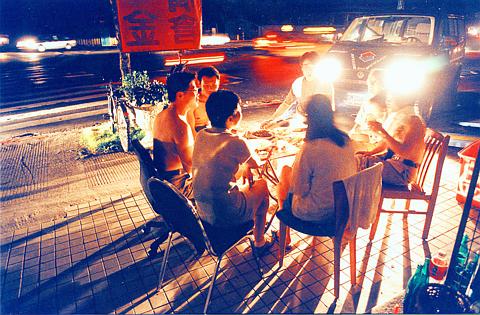Responding to a study released yesterday by the Cabinet-level Research, Development and Evaluation Commission (
"We've been frustrated by previous failures to buy land in rural areas suitable for building high-voltage towers. It's difficult to guarantee power supply in such a situation," said Lee Gan-charng (
At a draft review meeting on the study held yesterday, commission officials said that in the wake of two islandwide power outage incidents on July 29 and Sept. 21, finding ways to enhance the reliability of the electrical supply has become a priority.

PHOTO: CHANG CHIA-MING, LIBERTY TIMES
"In Taiwan, the power policy has long focused on power generation rather than electricity transmission. This makes providing reliable power transmission more challenging than elsewhere.
In addition, a commonly seen "not in my backyard" attitude toward public construction makes building high-voltage towers in rural areas more difficult," said the commission's chairman, Wea Chi-lin (
In the study, researchers from the Chung-hua Institute for Economic Research (??華經濟研究院) pointed out the irony of Taipower's policy of transferring power supplies from southern Taiwan to the north (南1q北送). Researchers argued that problems exist in several places, including the maintenance of the electrical system's security, the management of electricity transmission congestion and electricity shortage crises.
"To prevent future islandwide power outages, Taipower should disperse its generating system and adopt alternatives, including portable power generator systems and floating barge generators, both of which have been adopted in other countries where blackouts frequently occur, such as New Zealand and Japan," said George Hsu (3志義), one of the leading researchers behind the study.
However, experts suggested reviewing the existing grid structure first, at least as long as no alternatives are available.
"The existing transmission system is becoming increasingly fragile as demand increases. In engineering terms, I suggest monitoring power transmission at critical locations such as at Lungchi (龍崎), Chungliao (??寮), and Lungtan (龍潭)," said Chen Shih-lin (3?h麟), an electrical engineering professor from National Tsing Hua University.
According to Taipower, the July 29 power outage was the result of the collapse of a high-voltage tower at Lungchi, Tainan County, while the islandwide blackout after the 921 earthquake could be attributed to the shutdown of a transformer station at Chungliao, Nantou County.
The power transmission substation at Lungtan, Taoyuan County currently plays an important role in transmitting power to the north.
In addition, researchers suggest in the study that the government should adjust its existing price policy, as well as the structure of the industry.
"The promotion price for industry is outdated," said Wu Chung-chi (
While Taipower, under the supervision of the Commission of National Corporations (CNC,
"We've had both local and foreign experts study Taipower's two previous outages. A final report from a foreign team will be available in two weeks, which will be an important reference for adjusting policies," said CNC official Huang Jung-tzu (

INVESTIGATION: The case is the latest instance of a DPP figure being implicated in an espionage network accused of allegedly leaking information to Chinese intelligence Democratic Progressive Party (DPP) member Ho Jen-chieh (何仁傑) was detained and held incommunicado yesterday on suspicion of spying for China during his tenure as assistant to then-minister of foreign affairs Joseph Wu (吳釗燮). The Taipei District Prosecutors’ Office said Ho was implicated during its investigation into alleged spying activities by former Presidential Office consultant Wu Shang-yu (吳尚雨). Prosecutors said there is reason to believe Ho breached the National Security Act (國家安全法) by leaking classified Ministry of Foreign Affairs information to Chinese intelligence. Following interrogation, prosecutors petitioned the Taipei District Court to detain Ho, citing concerns over potential collusion or tampering of evidence. The

TRADE: The premier pledged safeguards on ‘Made in Taiwan’ labeling, anti-dumping measures and stricter export controls to strengthen its position in trade talks Products labeled “made in Taiwan” must be genuinely made in Taiwan, Premier Cho Jung-tai (卓榮泰) said yesterday, vowing to enforce strict safeguards against “origin laundering” and initiate anti-dumping investigations to prevent China dumping its products in Taiwan. Cho made the remarks in a discussion session with representatives from industries in Kaohsiung. In response to the US government’s recent announcement of “reciprocal” tariffs on its trading partners, President William Lai (賴清德) and Cho last week began a series of consultations with industry leaders nationwide to gather feedback and address concerns. Taiwanese and US officials held a videoconference on Friday evening to discuss the

NEGOTIATIONS: The US response to the countermeasures and plans Taiwan presented has been positive, including boosting procurement and investment, the president said Taiwan is included in the first group for trade negotiations with the US, President William Lai (賴清德) said yesterday, as he seeks to shield Taiwanese exporters from a 32 percent tariff. In Washington, US Trade Representative Jamieson Greer said in an interview on Fox News on Thursday that he would speak to his Taiwanese and Israeli counterparts yesterday about tariffs after holding a long discussion with the Vietnamese earlier. US President Donald Trump on Wednesday postponed punishing levies on multiple trade partners, including Taiwan, for three months after trillions of US dollars were wiped off global markets. He has maintained a 10 percent

PERSONAL DATA: The implicated KMT members allegedly compiled their petitions by copying names from party lists without the consent of the people concerned Judicial authorities searched six locations yesterday and questioned six people, including one elderly Chinese Nationalist Party (KMT) member and five KMT Youth League associates, about alleged signature forgery and fraud relating to their recall efforts against two Democratic Progressive Party (DPP) legislators. After launching a probe into alleged signature forgery and related fraud in the KMT’s recall effort, prosecutors received a number of complaints, including about one petition that had 1,748 signatures of voters whose family members said they had already passed away, and also voters who said they did not approve the use of their name, Taipei Deputy Chief Prosecutor